Campaign Notebook
![]()
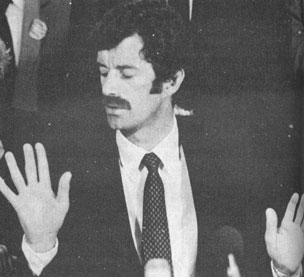 Some things are still the same, third time around. The manners of some RTE camera crews, for instance.
Some things are still the same, third time around. The manners of some RTE camera crews, for instance.
Two kids on the main street in Carlow - hey, look, there's whatsisname, you know, the one with the fuzzy hair. And they're craning for a gawk at the guy who just might be the next Taoiseach and an arm comes in from the right and with one swipe knocks the two kids out of the way. Three feet out of the way, to be precise. Scram, kid, out of the shot. Too many goddamn extras on the set, screwing up the election movie
Lunchtime, and the same crew's attempt to get some tricky car-to-bus shots of Garret - car and bus abreast, doing fifty on a narrow country road - comes up in conversation. If you didn't call it dangerous driving you couldn't call it anything. Someone says he saw them cutting into traffic to avoid a head-on and they came within a couple of feet of creaming whatsisname, Rodney Rice. Those of us travelling on the bus think it's funny, some of those in cars agree on a joke of their own: He pulls that stunt again I'm not pulling over - me neither - too dangerous - sideswipe city, right?
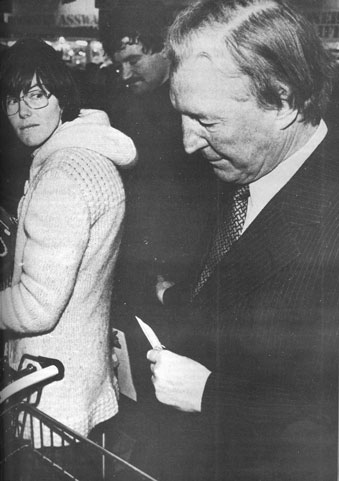 Not much else seems the same, third time around. The bus, even. Someone asks what time we get back on the van and Dave, the driver, does a double-take - like he's Beethoven and someone just told him that his da-da-da-daaaaah thing was a nice wee ditty. "Would you be referring to the ... luxury ... mini ... coach ... by any chance, huh?" Right, Dave, nice coach.
Not much else seems the same, third time around. The bus, even. Someone asks what time we get back on the van and Dave, the driver, does a double-take - like he's Beethoven and someone just told him that his da-da-da-daaaaah thing was a nice wee ditty. "Would you be referring to the ... luxury ... mini ... coach ... by any chance, huh?" Right, Dave, nice coach.
But there was a time when Fine Gael managed a train for Garret's whizz around the boonies. A whole train, with an engine and carriages and a kitchen and waiters. Just a handful of passengers. Breakfast, then everyone off the train to stand on the platform and listen to Garret tell a cheering crowd about how Charlie is running the country into the ground. Then, back on the train, the waiters have the tablecloths changed, time for Elevenses. Another cheering crowd on another platform, another speech and - hey, sniff, smell that? Something's cooking. And the scent of grilling meat drifting out across the crowd, mingling with the rising words of financial rectitude. Lunch, new tablecloths, afternoon tea. That wasn't just any old choo-choo, that there train was a legend. But that was 1981.
That was before Garret became Taoiseach and saw The Books and, gee willickers, he'd known things were bad, but not this bad.
No train in February 1982,just a big bus. This time around it's Dave and his luxury mini coach. No t-shirts, no funny hats, no rolls of stickers, no plastic bags with Fine Gael for a better deal printed on them, no campaign songs. Precious little palm pressing from the leaders. In 1981 both Haughey and FitzGerald ended their campaigns with right hands swollen and calloused from shaking hands - no need for the Nivea this time. This time everyone is playing it cool. (Except the RTE storm troopers, who think they're shooting a remake of May 1981.) This time you don't play with trains and helicopters, it's all to do with Trust, Credibility, Honesty, Integrity, Dignity, Frankness.
Which is not to say that these qualities are in any way evident in the campaign. Trust, Credibility etc. is this year's image. You be Henry Fonda and I'll be Gregory Peck. New clothes for the old ceremony. It's a media campaign. They do it with mirrors. And they have people in suits telling them how best to pose for the most flattering reflection.
Charlie started into the campaign like it was back in 1981. He doesn't like most reporters and most reporters don't like him, so he has evolved a technique. Part cajoling, part intimidatory. At his first press conference of the campaign he threw in the usual semi-flattering, semi-sarcastic remarks ("my favourite lady reporter"), a subtle challenge (inevitably taken up) to engage in the kind of repartee that discourages hard questioning. We're all in this together, folks, right? And then the occasional flash of annoyance and viciousness that ruins the atmosphere he has built up.
Pressed on the issue of illegitimacy he was "almost certainly likely to accept the recent report of the Law Reform Commission and proceed to legisla te". "What does almost certainly mean?" It means "very likely", says Charlie and gives his personal support to the measure. But. he's asked, what about the fifteen Cabinet members ranged along behind him could Padraig Flynn, for instance, say ... And as Flynn perks up to answer, Charlie cuts in. "Why don't you let me conduct my press conference, eh, Miss, eh ... ?" "Mr. Haughey, you're there with your friends ... "
The knife. Charlie knows that the paper which the reporter worked for has recently folded. "By the way, who are you representing at the moment?" "In Dublin, Charlie, as well you know". "Ah, good girl!" Laughter all round. "In Dublin!", yocks Ray McSharry. "Mr. Haughey, could we have Mr. Flynn's answer?" Flynn perks up again, his mouth opens ...
"I'm answering for Mr. Fl ... I'm answering for Fianna Fail", says Charlie. It appears that the high-price Cabinet members are here as decorations, to lend a little tone to the proceedings.
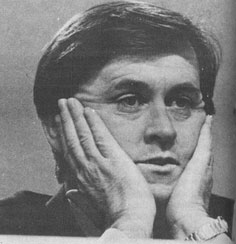 By the Thursday before polling day someone had had a word in Charlie's ear. When presenting the Book of Estimates he passed the microphone around as casually as if he was ... Garret FitzGerald. In that two weeks Charlie had worked his way into his new role, one he couldn't quite manage on the last two outings: Honest Charlie coming forth with a message of austerity. Now he could offer bus fare increases with the same frankness and generosity with which he used to offer airports. He looked relieved. He knew these measures weren't popular, he said, but it was "the honest thing to do". And he hoped the journalists would now givc him credit for his honesty. "We don't get credit for much in Fianna Fail in the media but I hope ... "
By the Thursday before polling day someone had had a word in Charlie's ear. When presenting the Book of Estimates he passed the microphone around as casually as if he was ... Garret FitzGerald. In that two weeks Charlie had worked his way into his new role, one he couldn't quite manage on the last two outings: Honest Charlie coming forth with a message of austerity. Now he could offer bus fare increases with the same frankness and generosity with which he used to offer airports. He looked relieved. He knew these measures weren't popular, he said, but it was "the honest thing to do". And he hoped the journalists would now givc him credit for his honesty. "We don't get credit for much in Fianna Fail in the media but I hope ... "
Careful, Charlie, keep the enmity under control, rein back, you're doing fine. See? It doesn't hurt that much. And on the other side of the political coin there was Garret, stonewalling, refusing to answer specific questions as if he was ... Charlie Haughey.
There was a time when all a Fianna Fail leader had to do was stand up and call for loyalty to "this great national party of ours" and the punters lined up with their biros to vote the party ticket. The long process of disintegration of the great national party took the reliability out of that one. But Garret has in this campaign seemed set on proving that there's still life in that kind of ploy. He wants loyalty to the image of a great national crusade for all that's fine and good. I'm Garret, trust me.
As Liam Cosgrave shuffled off the electoral coil FitzGerald emerged with a revamped product, a new invention: New Fine Gael, with the added wonder ingredient liberalism. It attracted the progeny of the emerged middle class, raised on Rock and Kahlil Gibran, Pelican sociology books on the shelf, Dylan (Thomas and Bob), Joplin (Janis and Scott), thought Vietnam was a bummer, nothing much really wrong with a toke or two (but there's nothing like a fine Beaujolais), sex is an exquisite experience but best shared with someone you really love, you know. Liberal attitudes to social issues came with the territory_
And there was Garret blowing the cob-webs off Fine Gael, passing out t-shirts, inviting them aboard his refurbished political vehicle. The Pepsi generation meets wise, kindly Judge Hardy. (Hey, gang! Why don't we put our own political party right here in this barn!) We'd like to teach the world to sing in perfect harmony - but, first, pass the calculator and let's help Garret Balance The Books. Fine Gael made The Great Leap Forward. The quivery-cheeked ex-Majors, the (neatly pressed) denim-clads, the professionals with the well-oiled Swingometers that could detect a shifting First Preference at fifty paces.
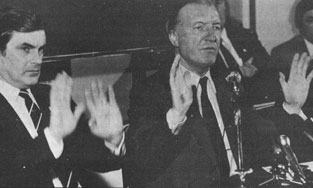 'Fine Gael had to change in order to stay alive - so it was in the best position to adapt to a changing Ireland. Fianna Fail, secure in its myths and its majority, didn't have to change - and was cracked by the shifting undercurrents it couldn't recognise. So Garret was the one who could best go through this election appealing not to policies but to Allegiance To A Great Ideal. In his sorties outside Dublin he refused to make commitments on any local issues, at his press conferences he refused to be specific on his economic policies and stood on his record of integrity. Whether in a country hotel or in Jury's for a press conference he happily hugged questions about marginals and swings, discussed them in loving detail ("Yes, I thought 1.2 percent seemed a little small - 3 1/2% is probably more realistic.')
'Fine Gael had to change in order to stay alive - so it was in the best position to adapt to a changing Ireland. Fianna Fail, secure in its myths and its majority, didn't have to change - and was cracked by the shifting undercurrents it couldn't recognise. So Garret was the one who could best go through this election appealing not to policies but to Allegiance To A Great Ideal. In his sorties outside Dublin he refused to make commitments on any local issues, at his press conferences he refused to be specific on his economic policies and stood on his record of integrity. Whether in a country hotel or in Jury's for a press conference he happily hugged questions about marginals and swings, discussed them in loving detail ("Yes, I thought 1.2 percent seemed a little small - 3 1/2% is probably more realistic.')
Sometimes, in his efforts to say little or nothing, Garret said more than he perhaps intended. Sunday morning,Jury's - in a room where much of both parties' campaigns have been fought. Pressed on his attacks on Haughey's stance on the Falkland issue FitzGerald took the position that condemnation of the sinking of the Belgrano and the death of four hundred people depended not on principle but on self-interest.
"There are a lot of things about the British actions in the Falklands I don't think were right, good or wise - but that doesn't mean that it's in the interests of this country, and our people here, and the lives of people in Ireland to go around saying that in a particular way most likely to cause damage to the Anglo-Irish relationship .. ."
"Would the aspects of British policy .. ."
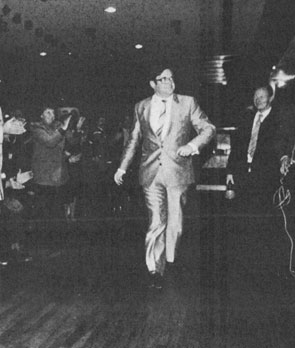 "Look, there's nothing to be gained for this country in going around expressing anti-British views for their own sake - or in taking public moral positions on a particular issue of that kind when it is not required of us to do so, if it is going to damage our primary interest."
"Look, there's nothing to be gained for this country in going around expressing anti-British views for their own sake - or in taking public moral positions on a particular issue of that kind when it is not required of us to do so, if it is going to damage our primary interest."
While admitting that Haughey had expressed attitudes "which are fairly widely shared here", FitzGerald thought the North should be the prime consideration. "It is a question of the prudence one exercises. One can feel what one likes about what British or other governments do - you don't always say what you feel if it's not going to be in the interests of your country ... Government is based on moral principles, but it does not mean that at every given moment you have to go around expressing your moral principles regardless of the damage they may do to the interests that you're seeking to pursue on behalf of your country."
Garret didn't necessarily disagree with Charlie's views on the Falklands - he just didn't think Charlie should open his mouth about it. When Charlie does that it's called expediency.
The Fianna Fail candidates in Meath are dull. They make dull speeches. They make long dull speeches. They say things like "this great democratic organisation of ours".
Jim FitzSimons: "When the Opposition forced this general election on us - once again we stand before the loyal grassroots of Fianna Fail and we ask you once again to deliver the goods for Fianna Fail and for our leader, Charles J. Haughey."
"And once again we will deliver the goods! Once again every ounce of ability, intelligence, sweat and blood .. ."
You get the picture.
There is a floating vote, there are marginals. And it is mostly to these marginals that the leaders have gone when they did what is in this campaign a perfunctory duty of pressing the flesh. Mostly it's about delivering the goods. Getting bums out of armchairs on Wednesday and delivering them into polling booths. Strengths are known. the tally is checked, the weak areas stroked, the goods delivered. The real election is fought in small areas, scattered constituencies and even portions of constituencies where the machine's grip is lax, where the votes drift. Accusations that Charlie is shifty or that Garret is a collaborator serve the purpose of in turn firming up and loosening the muscles of the machines, as well as possibly influencing the floaters.
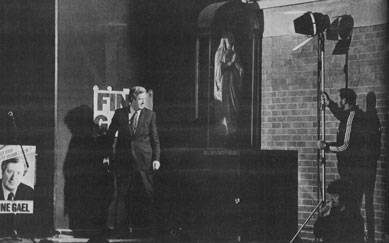 When the Meath candidates had had their interminable say Charlie delivered his trust me, I'm Charlie speech - the applause was strong but not wild. Then, down the aisle strode Ray Burke, shiny suit gleaming in the TV lights, his feet seeming to glide on the floor.
When the Meath candidates had had their interminable say Charlie delivered his trust me, I'm Charlie speech - the applause was strong but not wild. Then, down the aisle strode Ray Burke, shiny suit gleaming in the TV lights, his feet seeming to glide on the floor.
"I've been in North County Dublin tonight and they love us in North County Dublin! We're back to 1977 again!"
And the few words roused the crowd to a fervour. Ray was playing a stormer. There's room for the Trust Me, I'm Honest bit, and the green flag bit, and above all the bit that says that the stars are in their heaven and all's well with this great national organisation of ours.
Dick Spring has a touch of Jim Larkin about him. In his looks. But as he sits at the top table Frank Cluskey and Barry Desmond are getting away with murder, nudging him aside to get their spoke in. Spring holds loyally to the strategy determined by Conference, avoiding the morass into which Michael O'Leary took the party, but it leaves him flat-footed now and then, easy meat for the hungry would-bes beside him. Spring has produced a document titled Where Labour Stands. There's a poster on the wall behind him that says Where Labour Stands. As he tries to answer questions without saying anything he shouldn't the poster falls off the wall.
There's another poster that says Labour's voice will be heard. Slowly, that too begins falling off the wall. John Horgan moves back to prop it up with his shoulder.
It was Spring who convinced the recent Labour Party Conference to hold off from taking a position on the Constitutional Amendment until they had seen the wording. Now he had seen the wording and he still didn't want to take a position until he'd dis.cussed it with the other party leaders. Dick has learned that the thing to do this time around is take a stand, any stand, be vague about the details, kick for touch and say Trust Me. Admit that when you're elected you'll kick people in the face - or at least in the pocket - but convince them you'll wear a slipper instead of the hobnailers the other crowd are wearing. Trust Me.
